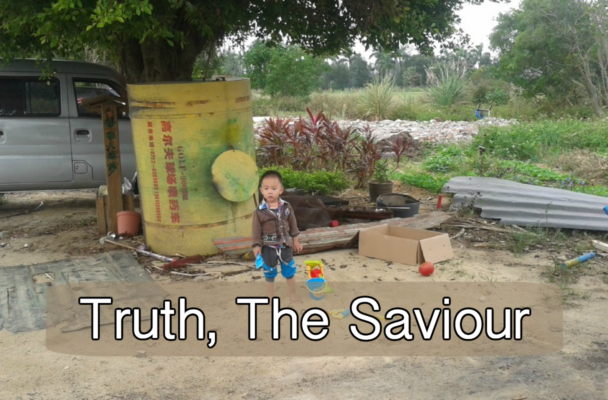Truth, The Saviour

This is the third text from the so called Gospel of Buddha.
Truth, The Saviour, for me, speaks of the folly of becoming attached to the material world, of believing too much in the self.
Not by accident do the English terms Selfishness and Selflessness project such strong and opposing meanings. One is hugely negative and the other somewhat immeasurably positive.
We see repeatedly that people who have relatively little in material wealth, quite often have a bright, happy outlook, perhaps freed of the burden of too many worldly goods and free to use, as Jacob Needleman says, “the only thing that we human’s possess”, our Attention to attain tranquility in what is to the bustling busy-ness person…mundane.
“Out of the way, it’s a busy day
I’ve got things on my mind” Us and Them, Pink Floyd
“The man in the silk suit hurries by
As he catches the poor old lady’s eyes
Just for fun he says, “Get a job.” The Way It Is, Bruce Hornsby
If we can learn to bring our Attention, our only real possession, to bear on just one thing at a time, everyday life is lived to the full regardless of whether you are washing your one change of clothes in a river or driving a gleaming red Ferrari.
Our obsession with things, I think is driven by language. Alan Watts continually cautioned against naming things. It’s a western, human obsession. We name the birds, so that we can’t say we’ve seen a Golden Plover until we check our bird book to see what it’s called. We still saw it, regardless of it’s human appointed name. The Golden Plover doesn’t have any concept of its name.
The Truth, The Saviour, then is to me the truth that the bird has no name, your left arm, although named as such has no way of existing without the rest of your body.
I’ll continue to give my attention to one thing at a time. That’s the truth, the saviour.
*************************************
Truth, The Saviour
“THE things of the world and its inhabitants are subject to change. They are combinations of elements that existed before, and all living creatures are what their past actions made them; for the law of cause and effect is uniform and without exception.
But in the changing things there is a constancy of law, and when the law is seen there is truth. The truth lies hidden in Samsara as the permanent in its changes.
Truth desires to appear; truth longs to become conscious; truth strives to know itself.
There is truth in the stone, for the stone is here; and no power in the world, no god, no man, no demon, can destroy its existence. But the stone has no consciousness. There is truth in the plant and its life can expand; the plant grows and blossoms and bears fruit. Its beauty is marvelous, but it has no consciousness. There is truth in the animal; it moves about and perceives its surroundings; it distinguishes and learns to choose. There is consciousness, but it is not yet the consciousness of Truth. It is a consciousness of self only.
The consciousness of self dims the eyes of the mind and hides the truth. It is the origin of error, it is the source of illusion, it is the germ of evil. Self begets selfishness. There is no evil but what flows from self. There is no wrong but what is done by the assertion of self. Self is the beginning of all hatred, of iniquity and slander, of impudence and indecency, of theft and robbery, of oppression and bloodshed. Self is Mara, the tempter, the evil-doer, the creator of mischief. Self entices with pleasures. Self promises a fairy’s paradise. Self is the veil of Maya, the enchanter. But the pleasures of self are unreal, its paradisian labyrinth is the road to misery, and its fading beauty kindles the flames of desires that never can be satisfied.
Who shall deliver us from the power of self? Who shall save us from misery? Who shall restore us to a life of blessedness?
There is misery in the world of Samsara; there is much misery and pain. But greater than all the misery is the bliss of truth. Truth gives peace to the yearning mind; it conquers error; it quenches the flames of desires; it leads to Nirvana. Blessed is he who has found the peace of Nirvana. He is at rest in the struggles and tribulations of life; he is above all changes; he is above birth and death; he remains unaffected by the evils of life.
Blessed is he who has found enlightenment. He conquers, although he may be wounded; he is glorious and happy, although he may suffer; he is strong, although he may break down under the burden of his work; he is immortal, although he will die. The essence of his being is purity and goodness.
Blessed is he who has attained the sacred state of Buddhahood, for he is fit to work out the salvation of his fellow beings. The truth has taken its abode in him. Perfect wisdom illumines his understanding, and righteousness ensouls the purpose of all his actions. The truth is a living power for good, indestructible and invincible! Work the truth out in your mind, and spread it among mankind, for truth alone is the savior from evil and misery. The Buddha has found the truth and the truth has been proclaimed by the Buddha! Blessed be the Buddha!”
*************************************
Books to read:

Leave a Reply